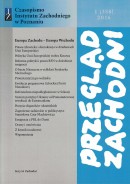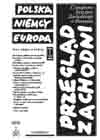
Polish Church Administration in Western Pomerania in the Face of Increasing Indoctrination in the Years 1945-1972
Polska administracja kościelna na Pomorzu Zachodnim wobec narastającej indoktrynacji w latach 1945-1972
The article presents the stance of the Polish Church administration in Western Pomerania in the face of increased indoctrination in the years 1945-1972. The activity of the first post-war primates of Poland, August Hlond and Stefan Wyszyński is discussed. Both of them found themselves in a dilemma between the demands of the new state authorities on the one hand, and the expectations of the Apostolic See and the hierarchy of the German Church on the other. It must be remembered that the policy of the communist regime strove to undermine the role of the Church in Poland. The changes that took place in 1956 alleviated the conflict between the state and the Church – the crucial developments included the political thaw after the death of Stalin, the address of Polish bishops to German bishops and the signing of the border treaty between Poland and the FRG.
More...
